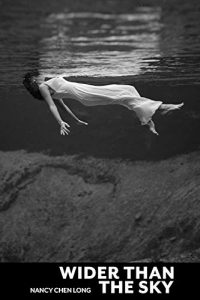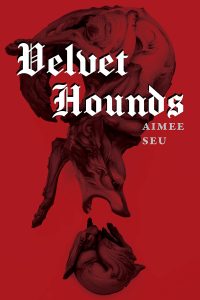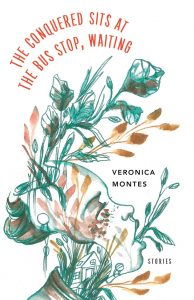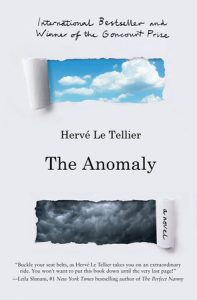Poetry. 72 pgs. Diode Editions. March 2020. ISBN: 978-1-939728-36-4.
Nancy Chen Long’s Wider than the Sky centers around the idea of memory: how memory forms our identity, how it wounds as well as provides windows for escape. The poems are beautiful, human and relatable but also incredibly painful, as many of the memories carry heartbreaking interactions.
In every poem, memories haunt the speaker. In “Home Islands” the old man tries to forget the guilt that haunts him for a target practice gone awry. He tears “a corner / from the fabric / of his war-memory.” Here, memory is made object, or perhaps more accurately, desired as object: something that can simply be torn out and “placed…into the wing / of a passing heron on her way home after winter.” However, memory proves to be more complicated to interact with.
In Section 2’s “Your Brain Doesn’t Contain Memories—It is Memories,” a girl “sponges off a family’s stain.” This image embodies one of the recurring desires in the collection, to forget what has been engrained to memory. This is particularly clear in the poem “Umbra,” where Long uses the sestina’s repetition to recreate a relentless desire for escape. The mother’s day is “overrun with dreams.” The father “escapes” into a daydream, and says that “escape is in the mind.” The moon “[i]nvites you to escape.” The boy’s fortune says “no one escapes alive.” Escape is a desire of the mind, but memory never allows us to fully escape. Only the geese seem to succeed in escaping.
What I found to be the most heartbreaking element of the collection were the untruths taught to the speaker from a young age. As the poem “Interstice” says, “Our memory is flooded / with holes, pocked like cotton eyelet.” There are holes alright—the absence of truth never given to the speaker. The poem “Learning to Barter with God the Way My Mother Barters with the Fishmonger Over Yesterday’s Spoils” is particularly painful to read for this reason with the lies being told to the speaker that “Not all will find a home” and “God will be as you are—good if you are good, bad if you don’t do as I say.” I don’t doubt for a minute that these memories are true, that these are things the speaker actually heard, but I couldn’t help but be grieved, hearing how God was modelled for the speaker.
While we see the painful elements of personal memory, Long also reminds us of the danger of forgetting. In “Reverberation,” the speaker asks: “If six million people were killed in a genocide, / if people were bombed by citizens of their own country, / yet no one remembers, did it happen?” We see the speaker’s mother distort truth by manipulating memory, insisting on the validity of her narrative based on what she decides to remember and not remember. The poem “Echo” shows memory as memorial in how the tree “remembered the missing, recorded / echoes of the branch that had been destroyed.” Long warns us of the dangers of silence, and the danger of letting distorted memories erasure reality.
The refrain “Your Brain Doesn’t Contain Memories—It is Memories” is used to title poems in each section, and functions as a kind of thesis statement for the collection: memories and self are conflated. We are what we remember. We are what we experience. The poems in Wider than the Sky speak to the haunting, the permanent scar we carry through memories. As the poem “Wordlust” describes: we are people “chasing a flood / of sorrows.”
That said, there is hope given for agency and transformation. The poem “It Should Have Been Winter” explores the possibility: “If our life is what our thoughts make it, / then we are mutable, able to create / ourselves as we go along, able to recast our past.” The poem “Narrative is the Native Tongue of the Brain” demands even further: “we must be mutable, mustn’t we?…creating ourselves as we go.” We do not have to remain at the mercy of our memories; we can choose how we change and move forward.
Long’s poems are brave to take such painful subject matter head-on without sentimentality. As the speaker in the poem “Cataract” says, “I enter that wound.” The act of writing poetry is an act of entering wounds, one that Long does not shy away from. She proves to be a skilled poet, utilizing forms like the sestina and pantoum to recreate the looping, ghost-like nature of memory. Wider than the Sky is an interesting, heartbreaking examination of memory that readers will easily find themselves connecting with.
Wider Than the Sky is available through Diode Editions. Purchase it now through their website.
MEG EDEN is a 2020 Pitch Wars mentee, and her work is published or forthcoming in magazines including Prairie Schooner, Poetry Northwest, Crab Orchard Review, RHINO and CV2. She teaches creative writing at Anne Arundel Community College. She is the author of five poetry chapbooks, the novel Post-High School Reality Quest (2017), and the poetry collection Drowning in the Floating World (2020). She runs the Magfest MAGES Library blog, which posts accessible academic articles about video games (https://super.magfest.org/mages-blog). Find her online at www.megedenbooks.com or on Twitter at @ConfusedNarwhal.
Like what you’re reading?
Get new stories or poetry sent to your inbox. Drop your email below to start >>>
OR grab a print issue
Stories, poems and essays in a beautifully designed magazine you can hold in your hands.
GO TO ISSUESNEW book release
China Blue by Catherine Gammon. Order the book of which William Lychack Jeffries calls “a fiery declaration of all that is inexpressible about desire and loss and the need to find a home in a world in which even the most solid and real of things feel often less than completely solid or real.”
GET THE BOOK



